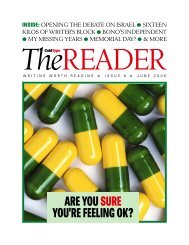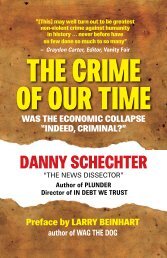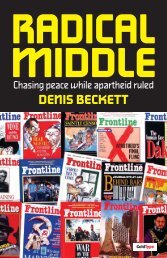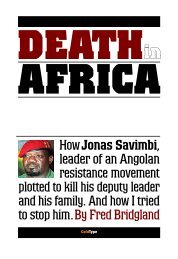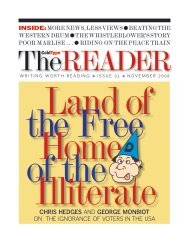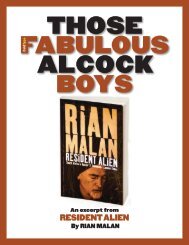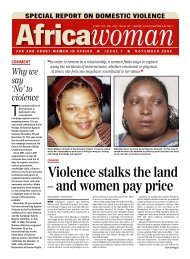UPDATED - ColdType
UPDATED - ColdType
UPDATED - ColdType
- TAGS
- updated
- coldtype
- coldtype.net
You also want an ePaper? Increase the reach of your titles
YUMPU automatically turns print PDFs into web optimized ePapers that Google loves.
EMBEDDED: WEAPONS OF MASS DECEPTION<br />
Reporting the World’s roundtable was hosted<br />
by journalist Anabel McGoldrick who posed<br />
important issues about the role of the media in<br />
covering the conflict:<br />
“ENABLING DEBATE – Did we do a good job<br />
of equipping readers and audiences to form their<br />
own views on the merits – or otherwise – of<br />
attacking Iraq?<br />
“MISSING PERSPECTIVES – What about the<br />
alternatives to war – non-violent ways of bringing<br />
about regime change? What other evidence<br />
was there about Iraq’s weapons programmes?<br />
“WHY – Why did we go to war? Was it over<br />
weapons of mass destruction? Removing Saddam?<br />
Oil? To help establish a ‘New American<br />
Century’ by force of arms?<br />
“CONTEXT – How effective were the embeds?<br />
Did we risk losing sight of the bigger picture?<br />
Did they distract us from real fighting and real<br />
casualties, such as the bombardment of the<br />
Republican Guard positions around Baghdad?<br />
“MISINFORMATION – Were facts ‘created’ in<br />
order to be reported? What really happened to<br />
Private Jessica Lynch; how many times did we<br />
hear that Umm Qasr had fallen or that there was<br />
an uprising in Basra? And was there anything<br />
staged about the fall of the Saddam statue in<br />
Baghdad?<br />
“SECURITY – Is the world now a safer or more<br />
dangerous place? Is Iraq now becoming a quagmire?<br />
Was Iraq liberated or did the war leave it<br />
as a chaotic, seething hotbed of resentment?<br />
How is it affecting the war on terrorism?”<br />
I was asked to have a say in the very heady<br />
company of newspaper editors and the head of<br />
news for the BBC. Happily, there is a transcript of<br />
my intervention to draw on so I can get it right:<br />
“The war that you saw in Europe, the war that<br />
254<br />
people saw in the Middle East and the war that<br />
we saw in America were different wars with different<br />
focus and a different emphasis. And I<br />
believe that CNN’s decision to offer two distinct<br />
newsgathering services, and I speak as a former<br />
CNN producer by the way, I believe that was<br />
because Chris Cramer and Rita Golden and their<br />
people knew that the rest of the world would not<br />
accept the jingoistic news coverage that was<br />
being fed to people in the United States and they<br />
were right to take pride in what they did.<br />
“But I challenge this notion that was very common<br />
in the top media executives, that we can’t<br />
get ahead of our audience, the audience was<br />
gung-ho for the war, therefore we have to give<br />
the audience what it wants and I think in doing<br />
so there was an abdication of journalistic responsibility.”<br />
TWO NATIONS, TWO WORLDVIEWS<br />
THE New York conference showcased the differences<br />
between British media discourse and our<br />
own. It was clear that the journalists from London<br />
were far more outspoken and adversarial<br />
than their American counterparts.<br />
Gary Younge of The Guardian noted that the<br />
U.K. media had covered Northern Ireland and<br />
French media had covered Algeria in much the<br />
same way that the U.S. media covered Iraq. But<br />
he was also blistering in his assessment of U.S.<br />
media telling me: “… Just a half an hour of any<br />
kind of news TV show or reading the papers,<br />
you’re wondering, you think you’ve lost half of<br />
the paper. Where’s the bit where you criticize,<br />
where you analyze, where you go into some<br />
depth and rip this thing apart?”<br />
New York Magazine’s Michael Wolff chal-




